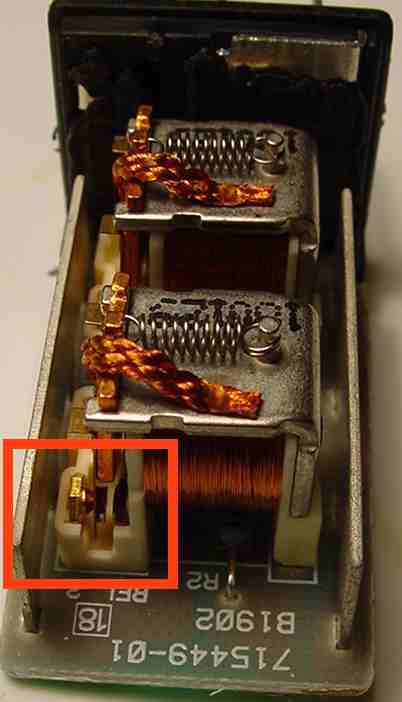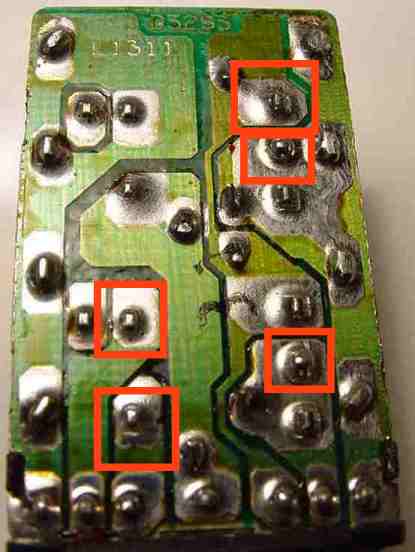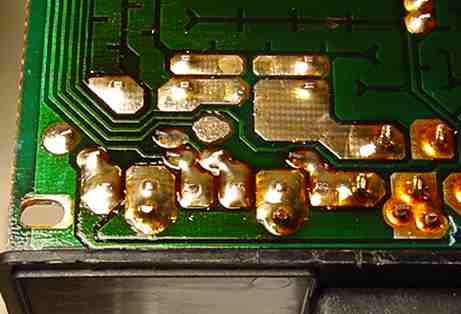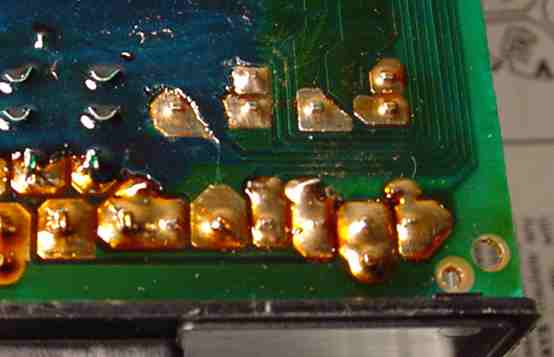
E32 owners either know about these things already, and have had them fixed, or need to know about them - that's what this page is for.
The LKM is the lights control module, most important for switching on the headlights. When it goes on the fritz, the main symptom is the lights becoming intermittent OFTEN WHILE DRIVING. A tap to the fuse box sometimes fixes it, but not for long and then the "outages" become worse. Dealer response seems to be replace, but these units are expensive (approx $400US each)...
The Mustard-coloured relay controls the tail/stop light power on early E32s (later ones did not have them, but it's easy to see if you have one). Symptoms are again intermittent brake and/or tail/side lights, with intermittent messages from the Check Control display of "TAIL LIGHT" or suchlike. New relays seem to be running about $60US...
Both units are easy to get at:

The LKM just pulls up & out.
The Mustard relay has retaining pins engaged in metal clips on the sides facing the wheels - they need to be pried off the pegs on the case of the relay if you can't just wiggle it out.
The Mustard Relay
The Mustard relay can be opened by prying it open from the bottom with jewellers' screwdrivers or similar fine flat-bladed screwdrivers. Note well the way the printed curcuit board comes out - there's a slot in the case it has to come back into on refitting.
The mustard relay contains no sensitive electronics - just relays & resistors. Here's what it looks like inside:


To fix the unit, you need to re-solder the joints to the relays on the PCB.... note the little moat-like rings on some of the soldering above -that's a proabable bad joint, they should all be nice and tent-like without the moat. You'll need:
- a good 25+ watt electronics
soldering iron
- some good electronics-grade
solder (comes in rolls like wire)
- preferrably some prior
practice at soldering so you can do the resolders without connecting solder
pads etc.
Basically, resolder everyting, reassemble and refit. Count $$$ saved.
The LKM
The LKM is similar but a more complex beast. It also has components sensitive to static electricity in it, so some handling care is required. I'm saying this up-front as then you know it's a slightly more advanced project, but only to follow more instructions, really.
The module changed internal construction around 1992 from the one presented here - this is my 1987 one. Click here to see the front (or the back) of the single curcuit board for the later module. The part below about finding & resoldeing the contacts for the relays still applies.
Here's what it looks like inside so you can get an idea - remember, you're still only resoldering the relay solder pads....

Notice the relays? One for lows, one for highs, one for fogs each side...
OK, you need your soldering gear again, but also a nice sharp screwdriver.
You open the case from the bottom - there are four barbs that overlap the bottom plate from the "can" body; pry them out of the way (some people report good use of old credit cards or similar stiff plastic sheets for this) then the boards slide out.
The integrated curcuits on the boards appear to be the static sensitive CMOS types, but Hella have painted all the parts with an insulating varnish so they should be OK for some light handling. Basically, try to handle by the edges of the PCB or the connector block when you can... there is no meed to touch the chips here anyway.
OK, now turn over the unit to see the bottom of the main cucuit board (attached to the main connector). What you have to fix is the relay soldering in either bottom corner, for the main relays. Here they are in all theri glory, the ones on my LKM anyway...


The one above shows how you may need to scrape back the varnish that has been painted over the board underside to get the joints clean for resoldering.
When finish, again, carefully
reassemble (make sure the two boards engage in the two slots in the case)
and reinstall. Test your lights - hopefully the intermittent operation
is a fading memory...